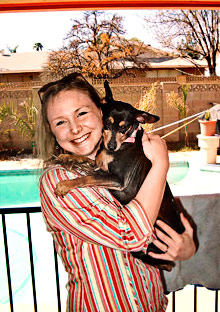Special Report: Operation Rescue

Alissa Austin and Gracie.
PAGE 6
The Woodleys exhausted their appeals in October 2007, freeing the foster families to adopt the dogs permanently. Barbara Woodley died four months later—her family believes it was the stress from the lawsuit that killed her. Robert Woodley moved away. Through his attorney, he declined comment.
Laureen Bartfield, the veterinarian, still tears up when she thinks about the outpouring of support for the Woodley dogs. "There were people who stepped forward to adopt the oldest, most arthritic, blind—whatever it was," she says. "It takes someone with patience to go through the heartache of putting them back together, not only physically but emotionally." Those who made the effort are determined to pack a lifetime's worth of good experience into the dogs' remaining years—"to erase what they have gone through and allow them to have a normal life."
Milo, the blind pug, loves fresh air but can't get around outdoors, even on a leash. So Kelly Wright, the real estate agent who ended up adopting him, wheels him through her Sanford neighborhood in a stroller. She and her husband, Brandon, don't mind this unusual arrangement. "It becomes part of you," Brandon says. "You make a commitment, and this is what it requires, and you just do it."
Bruce, the emaciated terrier, wasn't Jill Jaluvka's first blind dog, so the Halls of Hope volunteer already knew what to do. She placed air fresheners with different mild scents throughout her North Carolina home to help Bruce identify where he was. She laid carpet of varied textures, making paths to his bed and food bowl. Finally she contacted a veterinary ophthalmologist, who removed Bruce's cataracts. With his vision restored, the once-timid dog began taking delight in stacking toys and patrolling the perimeter of Jaluvka's yard. Jill found herself blossoming, too. "I'm more nurturing than I used to be," she says. "I like me better with Bruce."
Walter, who stood like a gopher, needed to be house-trained and taught not to nip at visitors or guard his food aggressively. "He was such a challenge to get well," says officer Heather Jackson. "And it's still a work in progress." These days Walter can be found sunbathing with Jackson's other dogs, or walking with her along the pond across the street. "To help him become a normal animal—as much as he can be normal—is profound," she says. "I think about how he had never been in the sun, or even set foot outside before. Simple things like that still get me."
Laureen Bartfield, the veterinarian, still tears up when she thinks about the outpouring of support for the Woodley dogs. "There were people who stepped forward to adopt the oldest, most arthritic, blind—whatever it was," she says. "It takes someone with patience to go through the heartache of putting them back together, not only physically but emotionally." Those who made the effort are determined to pack a lifetime's worth of good experience into the dogs' remaining years—"to erase what they have gone through and allow them to have a normal life."
Milo, the blind pug, loves fresh air but can't get around outdoors, even on a leash. So Kelly Wright, the real estate agent who ended up adopting him, wheels him through her Sanford neighborhood in a stroller. She and her husband, Brandon, don't mind this unusual arrangement. "It becomes part of you," Brandon says. "You make a commitment, and this is what it requires, and you just do it."
Bruce, the emaciated terrier, wasn't Jill Jaluvka's first blind dog, so the Halls of Hope volunteer already knew what to do. She placed air fresheners with different mild scents throughout her North Carolina home to help Bruce identify where he was. She laid carpet of varied textures, making paths to his bed and food bowl. Finally she contacted a veterinary ophthalmologist, who removed Bruce's cataracts. With his vision restored, the once-timid dog began taking delight in stacking toys and patrolling the perimeter of Jaluvka's yard. Jill found herself blossoming, too. "I'm more nurturing than I used to be," she says. "I like me better with Bruce."
Walter, who stood like a gopher, needed to be house-trained and taught not to nip at visitors or guard his food aggressively. "He was such a challenge to get well," says officer Heather Jackson. "And it's still a work in progress." These days Walter can be found sunbathing with Jackson's other dogs, or walking with her along the pond across the street. "To help him become a normal animal—as much as he can be normal—is profound," she says. "I think about how he had never been in the sun, or even set foot outside before. Simple things like that still get me."
Photo: Courtesy of Pat Daigle



